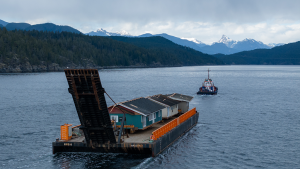Premier Christie Clark’s strategy for defeating the New Democratic Party (NDP) in the next provincial election is based on her job creation plan, which is the B.C. Liberal Party’s most important economic policy initiative.
“The strategy depends on having governed well and delivering on our plan,” said Premier Christie Clark in an exclusive interview by the Journal of Commerce, after she addressed members of the Independent Contractors and Businesses Association (ICBA) at their annual general meeting last week.
“So, the strategy is simple; stick with the plan, keep delivering economic results and make sure people know they have something at risk in the next election.”
In the run up to the next election on May 14, 2013, Clark said that in one year the B.C. Jobs Plan has made the province the leader for job creation in Canada, while stimulating billions of dollars in capital investment.
The assertion by Clark is supported with figures from Statistics Canada that show employment in British Columbia increased by 51,700 people in August 2012, compared to the same month in 2011.
The increase in total employment was the largest of all provinces. Alberta was in second place (+43,300), followed by Quebec (+24,500) and Ontario (+24.300).
Clark launched the B.C. Jobs Plan in September 2011 by making a cross-province tour with events in Prince Rupert, Kitimat Village, Kamloops, Surrey and Vancouver.
At this time, there were 2,270,900 people employed in B.C.
In September, 2,328,200 were employed in B.C., which represents an increase of 57,400 workers.
Several other indicators of construction activity are used by Clark to explain why the industry should support the Liberal Party in their campaign for re-election.
“It’s not about tearing the other guy down,” explained Clark.
“It’s about demonstrating to the people of the province that we got a really good thing going on here, number one in job creation, $80 billion worth of projects underway and trade with China is up 25 per cent in just one year. We have a good thing going. Let’s not mess it up. It’s not time for a change.”
The B.C. Major Project Inventory estimates that in June 2012 the capital cost of all major projects currently under construction in the B.C. was about $77.9 billion.
This figure is down slightly from $78.9 billion in the first quarter of the year.Clark also pointed to housing starts in the Vancouver Census Metropolitan Area, which have returned to 2007 levels.
According to Canada Mortgage and Housing Corporation (CMHC), the monthly seasonally adjusted annual rate for housing starts in Vancouver was trending at 20,000 units in September.
At the peak of the economic boom in 2007, Vancouver had a total of 20,736 housing starts.
During the recession in 2009, housing starts in Vancouver fell to a low of 8,339.
Clark predicts the construction industry is on the verge of the next boom, so the up-coming election in May is not the right time to change the government.
She said the construction boom will be driven by private investment in mining and the development of up to five natural gas export facilities in Kitimat, as well as public investment in major infrastructure projects, including the replacement of the George Massey Tunnel and twinning the Trans-Canada Highway from Kamloops to Alberta.
“In B.C., we are building a new industry aimed at exporting natural gas, so we can support the energy needs of growing economies like China,” said the premier.
“And, we are well on our way to reaching our goal of having three export facilities in operation by 2020.”
Encana has formed a new partnership with the operator Apache Canada Ltd. and EOG Resources Canada Inc., for a proposed $4.2 billion facility near the Port of Kitimat.
The partners have completed the front-end engineering and design for the LNG export facility. Project construction could begin in 2012, with exports potentially starting in 2015.
BC LNG Cooperative, which is a joint venture between the Haisla Nation and LNG Partners of Houston, is planning to construct and operate an LNG export terminal at Bish Cove near the Port of Kitimat.
The construction of the terminal will employ 150-200 people over 18 to 24 months and will cost between $360 million and $450 million.
A group of companies led by Shell is developing plans for the construction of a $12 billion LNG export facility near Kitimat.
The partners will decide whether to move ahead with the project’s development after conducting engineering work and environmental assessments.
As a result of these projects, Clark said the biggest challenge that the construction industry will face is finding a workforce to fill all the jobs that will be created.
“We have a booming construction sector and there are big plans to continue to invest in capital,” she said.
“So, that means we have a problem. But, it’s actually a good problem to have, which is how do you find workers.”










Recent Comments
comments for this post are closed